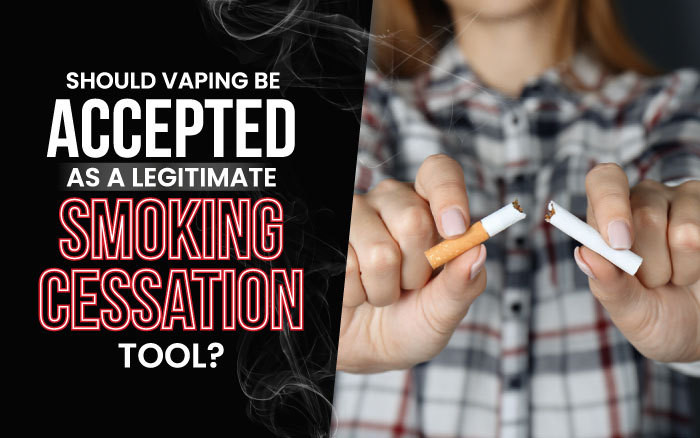Should Vaping Be Accepted as a Legitimate Smoking Cessation Tool?
Estimated 0 min read
The topic of smoking cessation is different from the issue of tobacco cessation. Those who want to quit smoking usually want to stop inhaling smoke. Those who want to stop tobacco usually want to quit nicotine altogether, although there are many sources of nicotine that do not require tobacco consumption.
It used to be that quitting smoking was quitting the smoke and the nicotine. But the future has brought us an alternative to pick between what we want to consume and what we don’t. We can consume nicotine without the smoke, or we can consume the smoke without the nicotine, we can do it while inhaling vapor, chewing tobacco, or munching on a piece of nicotine-infused gum.
But regulations seem to put a tighter hold on what we can and cannot do than the technology we have access to. Decisions like these probably come from noble reasons, but reality and politics have put us on alert to the real reasons why regulations come to life.
What Do Studies Say About the Quit Smoking Help Available?
According to the dean emeritus of the University of Michigan’s School of Public Health, there is enough evidence to support the claim that vaping is a valid tobacco cessation tool.
Few people appreciate the potential value of vaping as a smoking cessation tool. Notice we did not say benefits? That’s because we acknowledge the fact that not vaping is probably better than vaping at all, like not drinking is perhaps better than not drinking at all, or not taking drugs is often better than taking them at all. Of course, these claims are inconclusive and subject to a case-by-case scenario, but these are the most likely conclusions. However, we also need to acknowledge that there are alternatives, that while they may not be perfect, are likely better than others or have the potential to be used as a tool to reach an even better outcome altogether.
Most agencies in the United States and Canada acknowledge that vapes have potential benefits, but they don’t recommend vaping as a smoking cessation tool as they regard the evidence to back the claim up as insufficient, according to the authors of the 2023 study on the use of nicotine e-cigarettes as a tool for smoking cessation.
The study also implied that the promotion of vaping as a tool for smoking cessation can co-exist with the efforts to stop underage smoking and vaping. These are not mutually exclusive subjects and we can in fact stop underage consumption while allowing adults to make their own decisions. The language used by regulating agencies often suggests that both things cannot co-exist, but that’s an opinion-based conclusion rather than an evidence-based one.
What Does Evidence Say About Using an E-Pen as a Solution?
There isn’t sufficient evidence to conclude that e-pens can be used as a legitimate smoking cessation tool according to the CDC, even if the evidence is suggestive in nature. If this is all in fact true, then we stand by the decision to not market a product as something that cannot be conclusively proven yet.
But if the evidence is suggestive to that end, as specified on the official CDC website, then the real question is, what are we doing to prove it? And, are we doing anything at all or are we just trying to prove the contrary? These are the questions that need answering as these are the questions that generate distrust among industry stakeholders.
There are 7 total quit-smoking medication products that are approved by the FDA that include nicotine replacement therapies, Bupropion, and Varenicline, just to name a few.
However:
Nicotine replacement therapy is just looking for a different way to provide the body with the nicotine it’s looking for in a form other than vapor. But in some cases, people are just looking for something to puff on. Unfortunately, this cannot be conclusively proven, at least not yet, but if you know somebody who smokes or you’re a smoker or former smoker yourself, then you know that sometimes that’s all you really want.
Antidepressant medications like Bupropion are approved for use as a treatment of major depressive disorder (MDD) and its list of potential side effects includes anxiety, difficulty falling or staying asleep, dry mouth, dizziness, and headaches. The side effects of Varenicline are similar.
Conclusion
We can’t say that smoking in the U.S. should not be treated with the type of medication that the FDA has approved for smoking cessation programs. We rely on the CDC and FDA to take care of the public and fully support the agencies' recommendations. But it also feels like there is a space for tobacco cessation tools that don’t require nicotine consumption or the use of antidepressants. Which are both boxes that an e-pen checks.







